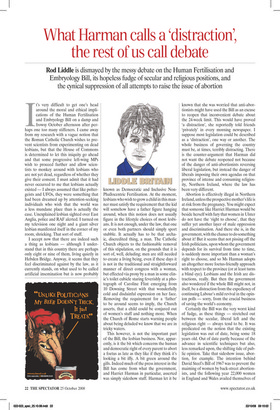What Harman calls a ‘distraction’, the rest of us call debate
Rod Liddle is dismayed by the messy debate on the Human Fertilisation and Embryology Bill, its hopeless fudge of secular and religious positions, and the cynical suppression of all attempts to raise the issue of abortion It’s very difficult to get one’s head around the moral and ethical implications of the Human Fertilisation and Embryology Bill on a damp and frowsy October afternoon after perhaps one too many stiffeners. I came away from my research with a vague notion that the Roman Catholic Church wishes to prevent scientists from experimenting on dead lesbians, but that the House of Commons is determined to let this iniquity go ahead and that some progressive left-wing MPs wish to proceed further and allow scientists to monkey around with lesbians who are not yet dead, regardless of whether they give their consent. I must admit that it had never occurred to me that lesbians actually existed — I always assumed that like poltergeists and UFOs, they were something that had been dreamed up by attention-seeking individuals who wish that the world was a less mundane place than is actually the case. Unexplained lesbian sighted over East Anglia, police and RAF alerted. I turned on my television one night and a giant silver lesbian manifested itself in the corner of my room, shrieking. That sort of stuff.
I accept now that there are indeed such a thing as lesbians — although I understand that in this country there are perhaps only eight or nine of them, living quietly in Hebden Bridge. Anyway, it seems that they feel discriminated against by the law, as it currently stands, on what used to be called artificial insemination but is now probably known as Democratic and Inclusive NonPhallocentric Fertilisation. At the moment, lesbians who wish to grow a child in this manner must satisfy the requirement that the kid will somehow have a father figure hanging around, when this notion does not usually figure in the lifestyle choices of most lesbians. It is not enough, under the law, that one or even both partners should simply sport stubble. It actually has to be that archaic, discredited thing, a man. The Catholic Church objects to the fashionable removal of this stipulation, on the grounds that it is sort of, well, deluding; men are still needed to create a living being, even if these days it is not in the traditional and straightforward manner of direct congress with a woman, but effected via proxy by a man in some clinic’s toilet cubicle staring feverishly at a photograph of Caroline Flint emerging from 10 Downing Street with that wonderfully cold and disdainful expression on her face. Removing the requirement for a ‘father’ to be around seems to imply, the Church asserts, that a child could be conjured out of women’s stuff and nothing more. When the Church of Rome starts warning people about being deluded we know that we are in tricky waters.
This however, is not the important part of the Bill, the lesbian business. Nor, apparently, is it the bit which concerns the human and democratic right of every parent to abort a foetus as late as they like if they think it’s looking a bit iffy. A bit green around the gills. Indeed much of the press interest in the Bill has come from what the government, and Harriet Harman in particular, asserted was simply sideshow stuff. Harman let it be known that she was worried that anti-abortionists might have used the Bill as an excuse to reopen that inconvenient debate about the 24-week limit. This would have proved ‘a distraction’, she reportedly told friends ‘privately’ in every morning newspaper. I suppose most legislation could be described as a ‘distraction’, one way or another. The whole business of governing the country must be, at times, terribly distracting. There is the counter-argument that Harman did not want the debate reopened not because of the danger of anti-abortionists reversing liberal legislation, but instead the danger of liberals imposing their own agendas on that province of intense and consuming religiosity, Northern Ireland, where the law has been very different.
Abortion is effectively illegal in Northern Ireland, unless the prospective mother’s life is at risk from the pregnancy. You might expect that someone like Harriet Harman would be beside herself with fury that women in Ulster do not have the ‘right to choose’, that they suffer yet another layer of male oppression and discrimination. And there she is, in the government, with the chance to do something about it! But it seems that not pissing off the Irish politicians, upon whom the government depends for its survival from time to time, is suddenly more important than a woman’s right to choose, and so Ms Harman adopts an altogether more foetus-friendly approach with respect to the province (or at least turns a blind eye). Lesbians and the Irish are distractions, really. But then the government also wondered if the whole Bill might not, in itself, be a distraction from the expediency of continuing Labour’s mild revival in the opinion polls — sorry, from the crucial business of saving the world’s economy.
Certainly the Bill was the very worst kind of fudge, as these things — stretched out between the secular, liberal left and the religious right — always tend to be. It was predicated on the notion that the existing legislation was out of date, being some 18 years old. Out of date partly because of the advance in scientific techniques but also, less remarked upon, the shifting tide of public opinion. Take that sideshow issue, abortion, for example. The intention behind David Steel’s Bill of 1967 was to prevent the maiming of women by back-street abortionists, and the following year 22,000 women in England and Wales availed themselves of this vibrant new opportunity. The latest available figures show that 193,700 abortions were carried out in 2006.
Clearly, something has changed. You might argue that abortion has become what it was never intended to be, a primary source of contraception for the ignorant, the lazy or the stupid. It is not the terror of sinister men with wire coat-hangers which drives women towards the smart and kindly clinics, but — in the main — sheer forgetfulness, the deregulation of sexual intercourse, allied to the broader point that for the bulk of the country, abortion — like single-parenthood, divorce, etc — has lost any vestige of stigma. What are you doing today, Chantrelle? Oh, I thought I’d watch Jeremy Kyle for a bit and then pop down for a quick abortion. The deep depression into which Chantrelle may well sink after her brief operation was not something which she anticipated. Nor, clearly, is it something imposed by the disapprobation of society — because, in the main, there is no such disapprobation. It must be something else, then.
Similarly, the advance in technology which seems to reveal that a foetus can remain alive independently from before 24 weeks has not unduly budged the public’s laissez-faire attitude toward late terminations. Unless you are a member of a church, then it is unlikely that you give a monkey’s one way or another.
Public opinion has shifted, too, on the main point of the Bill, the restrictions on exactly what can be done with human tissue and embryos by scientists. In the latest opinion poll some 61 per cent of the public supported (in effect) a liberalisation of those laws drawn up 18 years previously. And yet even here, the government has managed to muck it up, to introduce contention to an issue to which — the Roman Catholic Church excepted — few people took exception. As the scientists point out, the creation of human admixed embryos actually reduces the number of human eggs and embryos required for the production of stem cell research. There are still plenty of restrictions in place which prevent the scientists doing anything weird and diabolical with the embryo which they have created. But the government muddied the waters by allowing the scientists to take tissue material from people without their consent, a move described even by those sympathetic to the requirements of the scientific community as an ethical mess. It does not much matter that the number of occasions upon which this happens each year will be small; it is the principle of the thing. The same principle, incidentally, which the government intended to flout when it attempted to impose upon us all compulsory organ donations.
But then nothing in the Bill is based upon anything like principle, which is why we will need another Bill a decade or so from now to shift policy in line with public opinion (or public indifference) and further advances in scientific techniques. By which time I suppose it is possible that religious belief will have dwindled still further and the number of lesbians having availed themselves of these non-discriminatory fertilisation techniques will have grown into a majority. That seems to be the way things are going.



















































































 Previous page
Previous page